15 Essential Retail POS Features for Success in the UAE Market 2026

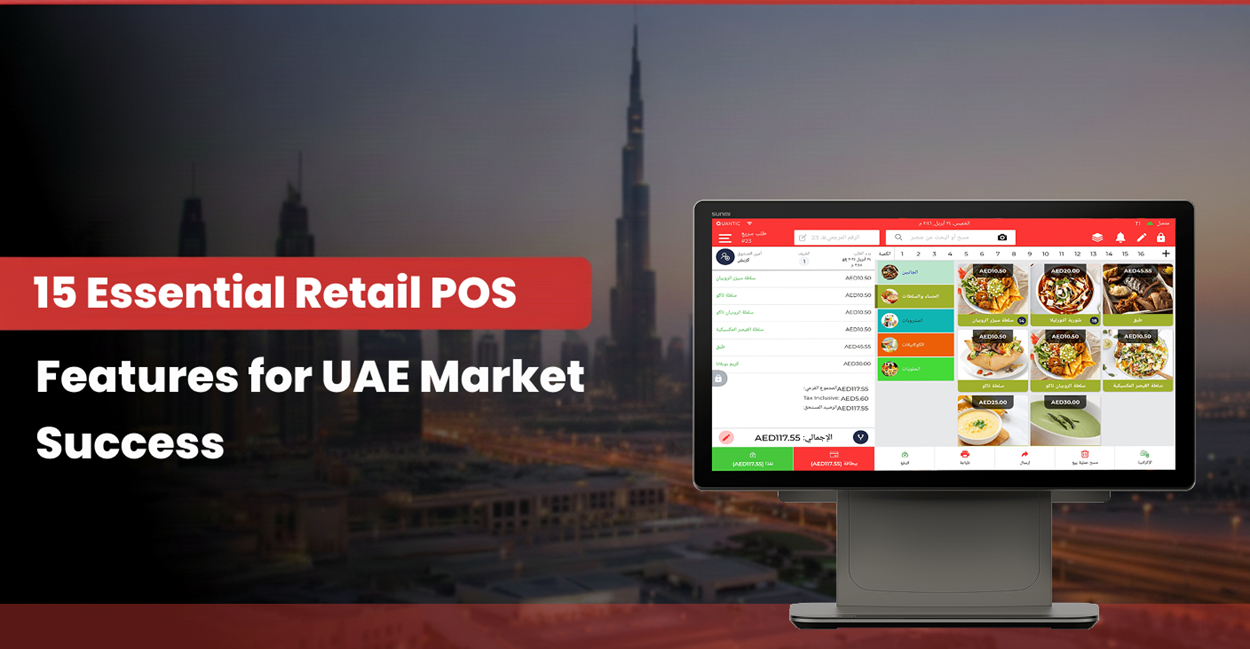
- What Makes the UAE Retail Market Unique
- Regulatory Environment, especially VAT & Government Compliance
- Multilingual / Multicultural Population and Language Preferences
- Multiple Payment Preferences & Fast Adoption of Digital Payments
- High Foot Traffic, Tourism, Seasonality & Shopping Culture
- Omnichannel Expectations, E-Commerce Integration
- Cultural & Regional Sensitivities
- Strong Government/Fintech Push & Innovation
- 15 Essential Retail POS Features for UAE Businesses in 2026
- 1. VAT & FTA Compliance Built-In
- 2. Real-Time Inventory Management Across Stores & Channels
- 3. Omnichannel Support
- 4. Flexible, Local & International Payment Methods
- 5. Fast & Smooth Checkout
- 6. Multi-Store Dashboard & Centralized Control
- 7. Customer Relationship Management (CRM) & Loyalty
- 8. Business Intelligence, Reporting & Analytics
- 9. Employee / Staff Management & Role-Based Access
- 10. Cloud-Based Architecture & Remote Access
- 11. Multilingual & Regional Customization
- 12. Hardware & Integration Flexibility
- 13. Security, Data Protection & Fraud Prevention
- 14. Promotions, Discounts, Coupons & Gift Card Support
- 15. Robust Offline Mode & Reliability
- Why UAE Retailers Choose Quantic POS to Scale Their Business
- Why These POS Features Matter for UAE Retailers
- Conclusion
- Frequently Asked Questions
The retail sector in the United Arab Emirates is among the most dynamic in the world.
Retail companies in Dubai, Abu Dhabi, Sharjah, and across the Emirates cannot afford to rely on outdated or generic point-of-sale systems.
This is due to the country’s booming tourism industry, large number of expatriate customers, strict regulations (VAT, data protection), and competition from both domestic and international brands.
Choosing the right retail POS features has become a strategic necessity rather than an option.
Valued at USD 119.5 million in 2024, the UAE cloud POS market is projected to reach USD 306 million by 2030, growing at a compound annual growth rate (CAGR) of 17%, driven by the increasing adoption of advanced POS solutions across the region.
At Quantic POS UAE, we have developed solutions tailored to the UAE market by collaborating with a wide range of retailers, from small boutiques to major department stores.
In this article, we’ll explore the top 15 retail POS features essential for success in the UAE market.
Use this checklist to evaluate potential solutions.
What Makes the UAE Retail Market Unique
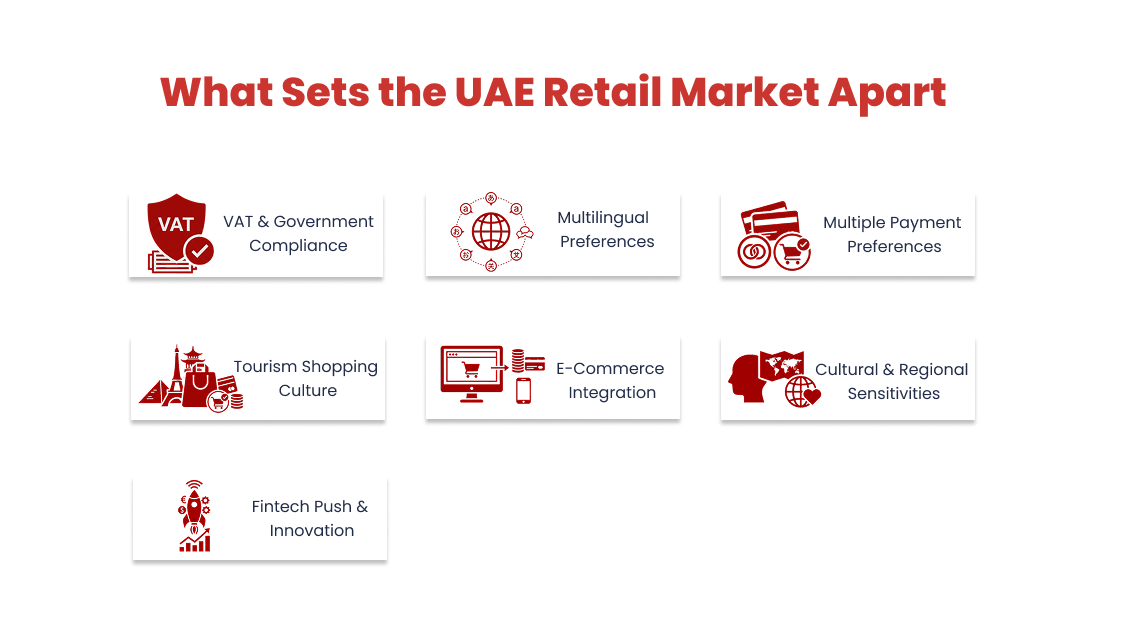
Regulatory Environment, especially VAT & Government Compliance
The Federal Tax Authority (FTA) has comprehensive regulations on how companies must issue invoices, maintain transaction records, and support audits. The UAE implemented a 5% VAT in 2018.
Key compliance requirements include:
- Providing VAT-compliant invoices that include the date, time, VAT breakdown, and TRN (tax registration number).
- Keeping books, sales and purchase ledgers, and transaction data for an audit for at least five years, for many records.
- Ensuring safe storage, digital record-keeping, and record retrieval for FTA audits.
Multilingual / Multicultural Population and Language Preferences
- There is frequent switching between Arabic and English, and the population is very diverse (many expatriates). Both staff and customer interfaces must be supported.
- According to studies, Arab users may prefer Arabic, but depending on factors like age and technological comfort, they also frequently choose English in places like Dubai. Others may prefer English in transactional settings (such as ATMs).
Multiple Payment Preferences & Fast Adoption of Digital Payments
- Digital and cashless payment methods, such as contactless, mobile wallets, cards, and QR codes, are becoming popular.
- According to a Visa study, over 70% of UAE retailers reported that accepting digital payments has increased their sales and foot traffic. In many situations, the majority of consumers now prefer to pay with a card or their phone rather than cash.
- Security, convenience, and speed are important in adoption decisions.
High Foot Traffic, Tourism, Seasonality & Shopping Culture
- With its robust mall culture, festivals (like the Dubai Shopping Festival), high presence of luxury retail, and flagship stores, the United Arab Emirates and Dubai in particular are world-renowned travel destinations. At some points, this results in extremely high customer volumes.
- Public holidays, Eid, and Ramadan are examples of local cultural and regional events that alter shopping hours, consumer behavior, and peak times. Retailers must adjust their scale appropriately. POS systems handle surges, potentially unreliable or offline connectivity, and other issues.
Omnichannel Expectations, E-Commerce Integration
- Customers anticipate online ordering, delivery, click-and-collect, and other services in addition to traditional retail. Retailers manage a hybrid inventory, cross-channel returns, and physical and virtual storefronts.
- Logistics, fast delivery, returns, and inventory visibility are important.
Cultural & Regional Sensitivities
- Holiday timings (Christian holidays, Ramadan, etc.), staff preferences, store hours, and shopping habits vary. Flexible settings (opening hours, shift scheduling, discount policies, etc.) must be supported by POS systems.
- Wording in Arabic, compliance with local laws, possibly Islamic finance, or local legal wording (such as disclaimers) may be required on invoices and receipts.
Strong Government/Fintech Push & Innovation
- The UAE government supports fintech innovation and the growth of digital payment ecosystems. Digital wallets, super apps, and open banking have all become increasingly popular.
- The number of new payment methods (such as wallet apps, QR codes, and instant payments) is increasing. Companies are under pressure and have an opportunity to embrace more advanced payment technology.
15 Essential Retail POS Features for UAE Businesses in 2026
A modern Point-of-Sale (POS) system is a comprehensive retail management solution that does more than just process payments.
The UAE retail market is projected to grow at a compound annual growth rate (CAGR) of 5.7% from its 2024 valuation of USD 44.38 billion to USD 61.89 billion by 2030.
The right POS can boost customer satisfaction, expedite processes, and increase compliance for UAE retailers.
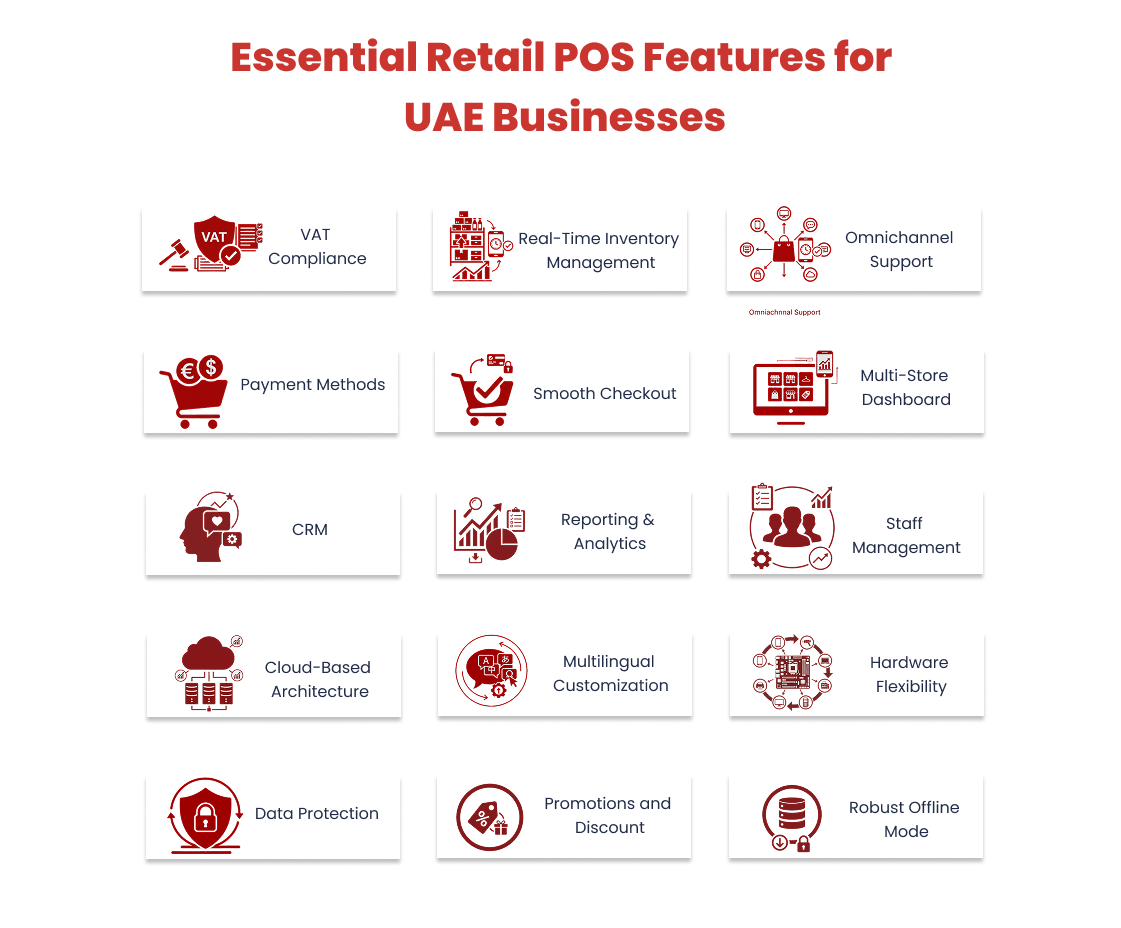
The following 15 essential Retail POS features are crucial for the UAE market success:
1. VAT & FTA Compliance Built-In
- Automatic VAT calculation (currently 5%) for all sales transactions.
- Generation of FTA-compliant tax invoices, credit notes, and reports.
- Detailed audit logs and transaction history for regulatory inspections.
- Automatic updates when VAT or other regulations change.
Why it matters:
Noncompliance may lead to penalties, fines, and operational disruptions.
Many UAE POS providers emphasize VAT compliance as a crucial component for meeting regulatory requirements.
2. Real-Time Inventory Management Across Stores & Channels
- Monitor stock levels across multiple outlets and warehouses in real-time.
- Synchronize inventory between online stores and physical locations.
- Receive stock alerts or review inventory reporting.
- Facilitate smooth inter-branch stock transfers.
Why it matters:
To avoid stockouts and losses, retailers with locations in Dubai, Sharjah, and Abu Dhabi, as well as those who combine online and physical retail, require precise inventory visibility.
The expansion of e-commerce and rising technological adoption have driven the UAE inventory management services market, which is estimated to be worth USD 170 million.
3. Omnichannel Support
- Unified product catalogs, pricing, and promotions for both online and offline channels.
- Click-and-collect or BOPIS functionality.
- Centralized handling of returns and exchanges across channels.
- Consolidated customer data: purchase history, preferences, and interactions.
Why it matters:
Customers expect flawless service whether they buy in person or online, and omnichannel support boosts client loyalty and satisfaction.
The importance of omnichannel strategies is highlighted by the fact that 56% of UAE consumers shop through both channels.
Retailers with omnichannel capabilities have seen a 56% increase in customer satisfaction.
4. Flexible, Local & International Payment Methods
- Accept major credit/debit cards and contactless payments.
- Support digital wallets like Apple Pay, Google Pay, and Samsung Pay.
- Integrate local UAE payment gateways and mobile wallets.
- Payment terminal integration for secure transactions.
Why it matters:
Checkout speed and convenience are crucial, particularly in crowded malls and during busy times of the year.
39% of UAE citizens regularly use mobile wallets, and 88% have made digital payments in the last 12 months.
Additionally, after accepting digital payments, 70% of UAE retailers reported an increase in sales and customers.
5. Fast & Smooth Checkout
- Barcode scanning and quick product search features.
- Split payments, apply discounts and promotions instantly.
- Print or email receipts immediately.
- Optional mobile POS devices for checkout anywhere in-store.
Why it matters:
Reducing queue times improves conversion rates and customer satisfaction.
6. Multi-Store Dashboard & Centralized Control
- View sales, inventory, promotions, and staff performance across all branches.
- Push updates like pricing and promotions to multiple outlets simultaneously.
- Simplify inter-branch stock transfers.
Why it matters:
Centralized control lowers errors and administrative burden for UAE retailers with multiple locations.
Retailers who use centralized dashboards report 20% fewer inventory errors across their branches and up to 30% faster decision-making.
7. Customer Relationship Management (CRM) & Loyalty
- Maintain customer profiles, purchase history, and preferences.
- Loyalty points, rewards, and membership programs.
- Personalized promotions for birthdays, anniversaries, or special events.
Why it matters:
Strong loyalty programs encourage repeat business and help retain customers in a competitive retail market.
Personalized promotions can result in up to 20% higher redemption rates, and retailers with such programs can increase repeat purchase rates by 25–30%.
8. Business Intelligence, Reporting & Analytics
- Real-time dashboards highlighting best-selling products, peak hours, and branch performance.
- Historical trend analysis for sales, inventory, and promotions.
- Customizable reports and export options for deeper analysis.
Why it matters:
In the rapidly evolving UAE market, retailers can optimize their stock, staffing, and marketing decisions with the help of timely data.
Retailers who use data can increase sales by 10% to 15% and improve inventory turnover.
9. Employee / Staff Management & Role-Based Access
- Track staff performance and sales metrics.
- Role-based permissions to restrict access to sensitive functions (voids, refunds).
- Time and shift management, attendance tracking.
Why it matters:
Improving productivity, security, and accountability are especially crucial in establishments with a large number of temporary or part-time employees.
Payroll errors can be decreased by up to 25% with staff management tools, which also increase worker productivity.
10. Cloud-Based Architecture & Remote Access
- Dependable uptime, automated backups, and secure cloud hosting.
- Use a smartphone or the internet to access dashboards, track sales, and manage inventory remotely.
- Smooth patches and software upgrades.
Why it matters:
For UAE retailers managing multiple locations or who travel frequently, flexibility and remote access are essential.
Cloud-based point-of-sale systems facilitate remote monitoring, reduce maintenance expenses for IT by 20–30%, and enhance system security and uptime.
11. Multilingual & Regional Customization
- Interfaces in Arabic and English, at the very least.
- Formats for dates, receipt styles, and local currency.
- Adaptations for local business customs and tax laws..
Why it matters:
A user-friendly system is essential for both staff and clients, given the UAE’s diverse population of residents, visitors, and expatriates.
Companies with multilingual interfaces experience up to 30% fewer transaction errors and increased employee productivity in multicultural settings in the United Arab Emirates.
12. Hardware & Integration Flexibility
- Compatibility with barcode scanners, receipt printers, cash drawers, and payment terminals.
- Support for kiosks, self-checkout, and customer-facing displays.
- Integrates with e-commerce, accounting, ERP, and inventory systems.
Why it matters:
A POS system that integrates with your existing hardware and software reduces friction and implementation costs.
Retailers with flexible POS integration report 20–25% faster implementation times and fewer operational disruptions.
13. Security, Data Protection & Fraud Prevention
- Data encryption in transit and at rest.
- PCI-DSS compliant payment handling.
- Audit trails of all transactions, voids, and changes.
- Role-based access and user authentication.
Why it matters:
Protecting customer and business data is essential to prevent breaches, fines, and reputational damage.
PCI-DSS compliance can reduce the likelihood of payment fraud by up to 70%.
14. Promotions, Discounts, Coupons & Gift Card Support
- Time-based promotions, flash sales, and bundle deals.
- Digital and physical coupon redemption.
- Gift card issuance, redemption, and tracking.
Why it matters:
Promotions and loyalty programs drive traffic and boost sales during the Dubai Shopping Festival, Ramadan, and other campaigns.
Promotional initiatives can increase sales by 15–25%, while gift card programs enhance customer retention by up to 20%.
15. Robust Offline Mode & Reliability
- Continue processing sales even when the internet is down.
- Local caching of inventory, pricing, and transactions.
- Automatic syncing once connectivity is restored.
Why it matters:
Even in modern cities like Dubai, internet disruptions can occur, and a POS system that halts sales risks revenue loss and customer dissatisfaction.
Retailers with offline-capable POS systems can eliminate lost sales due to connectivity issues during outages.
Why UAE Retailers Choose Quantic POS to Scale Their Business
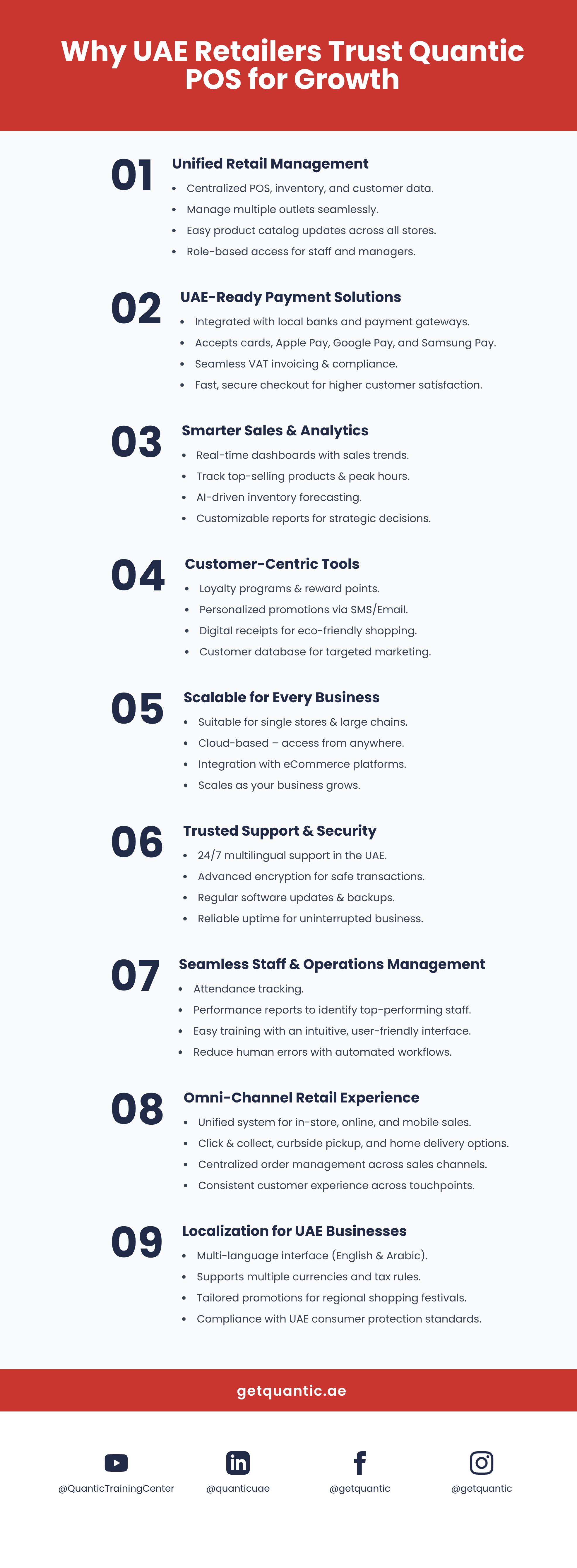
Why These POS Features Matter for UAE Retailers
Purchasing a modern point-of-sale system has a direct impact on efficiency, compliance, customer satisfaction, and growth for retailers in the United Arab Emirates. It’s not just about technology.
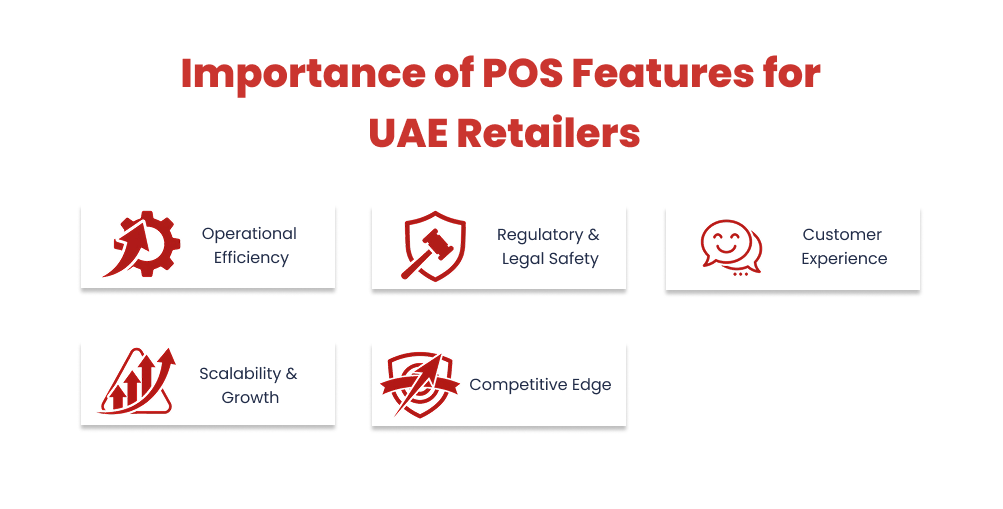
These 15 features are essential for the following reasons:
1. Operational Efficiency
Retailers in the United Arab Emirates operate in high-cost environments such as malls, flagship stores, and busy shopping areas.
Profit margins increase with each minute saved in staff management, inventory tracking, reporting, and checkout.
Features such as mobile point-of-sale (POS), fast checkout, and real-time inventory make daily operations more efficient.
2. Regulatory & Legal Safety
There is no negotiating compliance. Errors in UAE VAT and FTA regulations are punishable by severe penalties.
Legal safety is ensured and inspections are made easier with a point-of-sale system that has integrated VAT calculation, FTA-compliant invoicing, and audit-ready transaction logs.
Ensuring compliance protects the company from penalties, operational disruptions, and reputational damage.
3. Customer Experience
UAE consumers expect a seamless, convenient, and personalized shopping experience.
The right POS increases customer satisfaction and encourages repeat business with features like omnichannel support, flexible payment options, loyalty programs, and quick checkout.
Seamless returns, accurate stock availability, and personalized promotions create a satisfying brand experience that encourages repeat business.
4. Scalability & Growth
Many retailers in the UAE aim to grow by opening additional locations, launching new product lines, or integrating online and offline distribution channels.
A scalable point-of-sale system facilitates cloud-based access, centralized control, and multi-store management, enabling expansion without the inconvenience of switching systems.
5. Competitive Edge
Luxury brands, global chains, and powerful local players are all fighting for consumers’ attention in the fiercely competitive UAE retail market.
Retailers can make better decisions, attract more customers, and increase sales with the help of POS features like integrated marketing tools, real-time analytics, tailored loyalty programs, and targeted promotions.
Conclusion
Retail opportunities in the UAE are enormous, but only for companies prepared to make the necessary technological investments.
A modern retail point-of-sale system is the foundation for compliance, analytics, customer loyalty, speed, and flexibility; it is not just about collecting sales.
Use the 15 key features listed above as a guide when assessing point-of-sale (POS) systems.
You’ll be in a better position to work effectively, satisfy clients, and expand in the competitive UAE market if you have them.
Let’s explore how Quantic POS meets every one of these key features.
Get in touch for a demo right now, and we’ll guide you through it while customizing it to meet your specific retail requirements in the United Arab Emirates.
